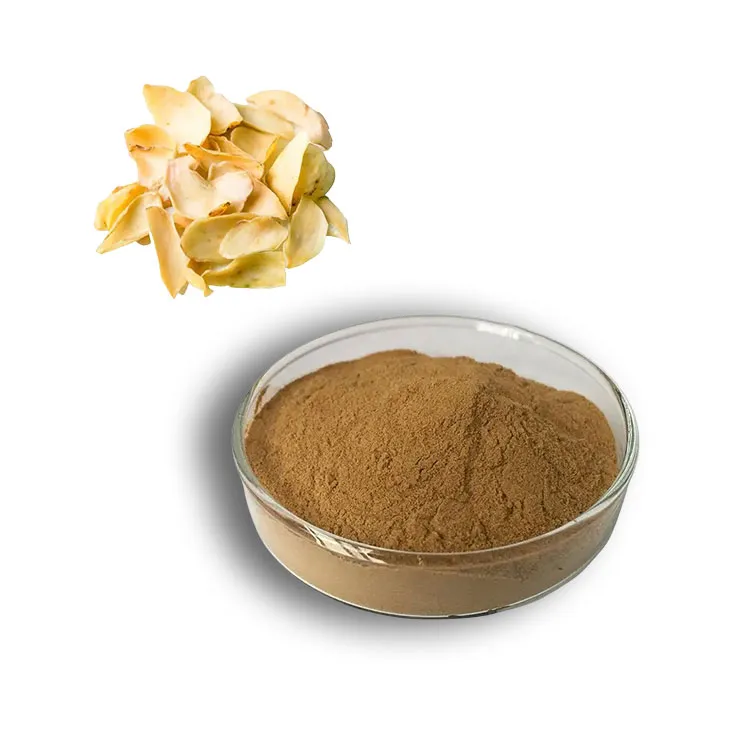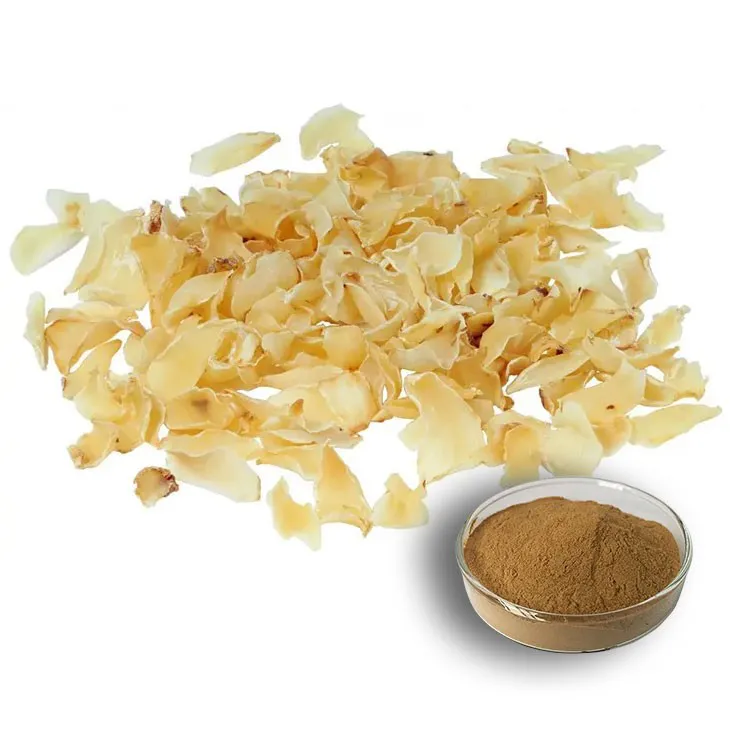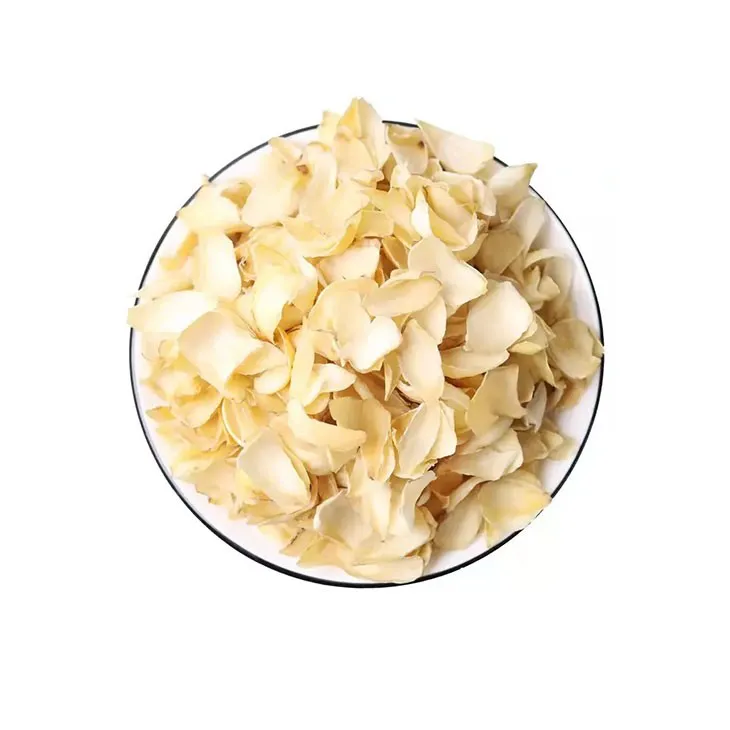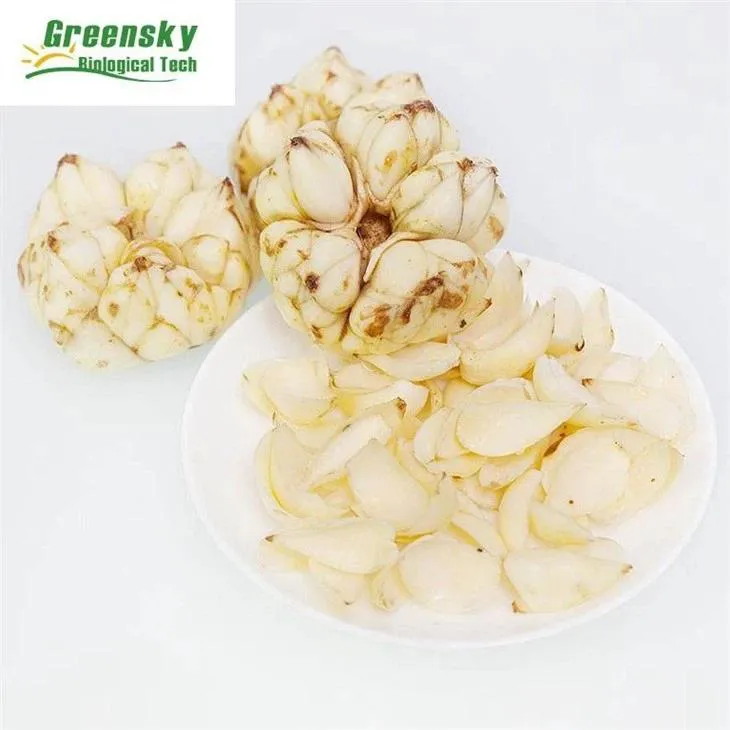- 0086-571-85302990
- sales@greenskybio.com
Understanding the Private Label of Lily Extract: A Comprehensive Guide
2024-12-20

1. Introduction to Lily extract
Lily extract is a remarkable substance that has been garnering increasing attention in various industries. Derived from the lily plant, it contains a rich blend of bioactive compounds. These compounds contribute to its diverse range of potential applications. The lily plant, known for its elegance and beauty, also harbors substances within its petals, bulbs, and other parts that can be processed to obtain the extract.

2. Quality Control in Lily extract Production
2.1. Raw Material Selection
The first step in ensuring high - quality lily extract is the careful selection of raw materials. Only healthy and mature lily plants should be used. The origin of the plants also plays a crucial role. For example, lilies grown in specific regions with favorable environmental conditions may yield better - quality extracts. Farmers need to follow strict agricultural practices to avoid contamination from pesticides, heavy metals, and other pollutants.
2.2. Extraction Methods
There are several extraction methods available for obtaining lily extract. Solvent extraction is one of the common techniques. However, the choice of solvent is critical as it can affect the purity and composition of the extract. Ethanol - based solvents are often preferred due to their relatively safe nature and ability to dissolve a wide range of compounds. Another method is supercritical fluid extraction, which uses substances like carbon dioxide in a supercritical state. This method can produce a more pure and clean extract with fewer residues.
2.3. Testing and Certification
Once the extract is obtained, it undergoes rigorous testing. Chemical analysis is carried out to determine the presence and concentration of key bioactive compounds such as flavonoids, polysaccharides, and alkaloids. Microbiological testing is also essential to ensure that the extract is free from harmful bacteria, fungi, and other microorganisms. Additionally, quality certifications such as GMP (Good Manufacturing Practice) and ISO standards are often sought to guarantee the overall quality of the lily extract.

3. Market Trends of Lily Extract
3.1. Growing Demand in the Cosmetic Industry
The cosmetic industry has witnessed a significant increase in the use of lily extract. This is mainly due to its potential benefits for the skin. Lily extract is believed to have moisturizing, anti - aging, and skin - brightening properties. It is incorporated into various products such as creams, lotions, and serums. Consumers are increasingly looking for natural - based ingredients in their cosmetic products, and lily extract fits this trend perfectly.
3.2. Use in the Pharmaceutical and Nutraceutical Sectors
In the pharmaceutical and nutraceutical fields, lily extract is being explored for its potential medicinal properties. Some studies suggest that it may have anti - inflammatory, antioxidant, and immunomodulatory effects. It could be used in the development of drugs or dietary supplements aimed at treating various health conditions. For example, it may be beneficial for respiratory problems or as a general health enhancer.
3.3. Emerging Trends in the Food and Beverage Industry
The food and beverage industry is also starting to show interest in lily extract. It can be used as a natural flavoring agent, adding a unique floral note to products. Additionally, due to its potential health - promoting properties, it may be added to functional foods and beverages. For instance, it could be incorporated into herbal teas or energy drinks.

4. The Role of Lily Extract in Various Products
4.1. Cosmetic Products
In cosmetics, lily extract plays a multi - faceted role. In skin creams, it helps to hydrate the skin by forming a protective barrier on the skin's surface. This barrier reduces water loss, leaving the skin feeling soft and supple. In anti - aging products, the antioxidants present in the extract can combat free radicals, which are responsible for premature skin aging. For skin - brightening products, lily extract may contain compounds that inhibit the production of melanin, resulting in a more even skin tone.
4.2. Pharmaceutical and Nutraceutical Products
When it comes to pharmaceutical and nutraceutical products, the potential of lily extract is vast. In drugs targeting inflammation, the anti - inflammatory properties of the extract could help reduce swelling and pain. As a dietary supplement, it can provide the body with essential nutrients and bioactive compounds. For example, the polysaccharides in lily extract may support the immune system, helping the body to fight off infections.
4.3. Food and Beverage Products
In the food and beverage industry, lily extract adds both flavor and functionality. In flavored waters or soft drinks, it imparts a delicate floral aroma and taste. In functional foods like energy bars or breakfast cereals, it can contribute to the overall health - promoting profile of the product. For example, if the extract has antioxidant properties, it can help protect the body from oxidative stress when consumed as part of a balanced diet.

5. Private Labeling of Lily Extract
5.1. Advantages of Private Labeling
Private labeling of lily extract offers several advantages. For manufacturers, it allows them to create a unique brand identity. They can customize the packaging, product name, and marketing strategy according to their target market. This also gives them more control over the product's quality and price point. For retailers, private - label products can offer higher profit margins compared to branded products. They can also differentiate themselves from competitors by offering exclusive lily extract products.
5.2. Challenges in Private Labeling
However, private labeling of lily extract also comes with challenges. One of the main challenges is ensuring consistent quality. Since private - label products are often produced in smaller batches compared to large - scale branded products, it can be more difficult to maintain the same level of quality control. Another challenge is marketing. Building brand awareness for a private - label lily extract product requires significant investment in marketing and advertising.
5.3. Strategies for Successful Private Labeling
To overcome these challenges, several strategies can be employed. Firstly, manufacturers should work closely with reliable suppliers to ensure a stable and high - quality source of lily extract. They should also invest in quality control systems that can be scaled down for smaller batch production. In terms of marketing, retailers and manufacturers can collaborate to create targeted marketing campaigns. For example, they can focus on promoting the unique features of the lily extract, such as its natural origin and potential health benefits.
6. Conclusion
In conclusion, lily extract is a valuable substance with a wide range of applications. Understanding the private label of lily extract is crucial for both manufacturers and retailers looking to capitalize on its growing popularity. By focusing on quality control, keeping up with market trends, and implementing effective private labeling strategies, they can successfully bring lily - extract - based products to the market and meet the increasing demand from consumers.
FAQ:
What is lily extract?
Lily extract is a substance derived from lilies. It contains various bioactive compounds that can have different properties and potential applications in the fields of cosmetics, medicine, and food.
Why is quality control important for lily extract private label?
Quality control is crucial for lily extract private label. It ensures that the extract meets certain standards in terms of purity, potency, and safety. Poor quality control may lead to products with inconsistent effects, potential health risks, and can also damage the brand reputation associated with the private label.
What are the current market trends of lily extract?
The market trends of lily extract are influenced by various factors. In the cosmetics industry, there is an increasing demand for natural and plant - based ingredients like lily extract, due to consumers' preference for more natural products. In the food and beverage sector, lily extract may be used for its potential health - promoting properties. Additionally, research and development efforts are constantly exploring new applications of lily extract, which also drives the market trends.
How does lily extract contribute to different products?
In cosmetics, lily extract can be used for its moisturizing, anti - inflammatory, and antioxidant properties. It may help improve skin texture and appearance. In the pharmaceutical field, it may potentially have certain medicinal properties that could be used in the development of drugs. In food products, it can add flavor and potentially offer some health benefits.
What are the challenges in developing a private label for lily extract?
There are several challenges. Firstly, ensuring a consistent supply of high - quality lilies for extraction can be difficult. Secondly, meeting regulatory requirements in different regions regarding the use of lily extract in various products can be complex. Thirdly, competition in the market is intense, so differentiating the private label from others requires significant effort in terms of product features, marketing, and quality.
Related literature
- The Bioactive Compounds in Lily Extract and Their Applications"
- "Quality Assurance in Lily Extract Production for Private Labels"
- "Market Analysis of Lily Extract - Based Products"
- ▶ Hesperidin
- ▶ citrus bioflavonoids
- ▶ plant extract
- ▶ lycopene
- ▶ Diosmin
- ▶ Grape seed extract
- ▶ Sea buckthorn Juice Powder
- ▶ Beetroot powder
- ▶ Hops Extract
- ▶ Artichoke Extract
- ▶ Reishi mushroom extract
- ▶ Astaxanthin
- ▶ Green Tea Extract
- ▶ Curcumin Extract
- ▶ Horse Chestnut Extract
- ▶ Other Problems
- ▶ Boswellia Serrata Extract
- ▶ Resveratrol Extract
- ▶ Marigold Extract
- ▶ Grape Leaf Extract
- ▶ blog3
- ▶ blog4
- ▶ blog5
-
Calendula Extract
2024-12-20
-
Black Garlic Extract
2024-12-20
-
Reishi mushroom extract
2024-12-20
-
Peppermint Oil
2024-12-20
-
Stevia Extract
2024-12-20
-
Sophora Japonica Flower Extract
2024-12-20
-
Panax Ginseng Leaf Extract
2024-12-20
-
Cassia Seed Extract
2024-12-20
-
Beta Carotene
2024-12-20
-
Lemon Balm Extract
2024-12-20





















